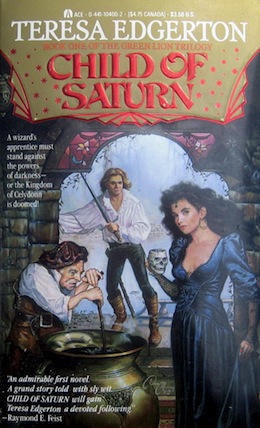In this series, Ilana C. Myer is revisiting the fantasy classics that first shaped her love of the genre, and evaluating them with new eyes. Sometimes the best way to comprehend the nature of a journey, when you’re in the middle, is to look back to its beginning…
When it comes to judging classic works, sometimes context is everything. It reminds me of when the Baz Luhrman film of The Great Gatsby came out and it became customary to deride the novel as old-fashioned, flawed, and politically wrong. Gatsby is, in fact, a stunningly written novel that is a product of its particular time and milieu, and not an especially egregious one at that. One need not compromise on the moral equivalent to one’s firstborn child to appreciate what the book has to offer while recognizing that politically, our society has changed since the 1920s. One can be critical without discarding a work as artistically worthless.
We run into similar issues when it comes to fantasy that is now considered old-fashioned, and Teresa Edgerton’s Child of Saturn is classic fantasy that would probably arouse critical reactions today.
Some attitudes to women and a low-stakes conflict are among the elements that make it unfashionable. But in context, it was a book that I discovered at a time when nearly my entire diet of fantasy consisted of grand epics and perilous journeys. What made Child of Saturn such a refreshing discovery—and so intriguing to me as a budding writer—is that it doesn’t rely at all on the devices of journeys or war that were par for the course in the fantasy I was reading at that time. The entire story, from beginning to end, takes place in the castle of Caer Cadwy and concerns the interrelationships of the characters, amid plenty of political intrigue. The enigmatic apprentice sorceress Teleri, tortured knight Ceilyn, seductive Princess Diaspad and her lady-in-waiting, the bitter Prescelli—these are the primary drivers of the story. The lesson I took away from it was thought-provoking: Put a bunch of finely-realized characters together in a space, make them play off each other, and you may have just enough story for a novel.
Rereading Child of Saturn, I noticed it is very much a debut novel; the author’s later works, like The Queen’s Necklace and Goblin Moon, are probably more assured. Being a debut author myself, I have only sympathy for this—our first books are, to a large extent, where we learn how to write. (I wrote an earlier novel in high school, too, which also taught me a lot, but still.) The characterization and mythology in Child of Saturn, together with its fascinating closed setting, make it worth reading nonetheless. The castle is atmospheric and a fitting backdrop to the power struggles of the king, queen, and their respective factions—which of course are manipulated on both sides by the dark sorcery of Princess Diaspad.
The characters begin as types, and while some remain so, the majority evolve into something surprising over the course of the book. The queen’s champion, Ceilyn, is probably the breakout character, beginning as grimly repressed; if there is a journey in the novel, it is his internal struggle between piety and potent sexuality. Prescelli, too, has more layers than one would expect, and here is my main criticism of the book: I don’t think she is allowed to be as complex as her potential suggests. She is, from my point of view, an entirely sympathetic, even tragic character, and I fear she is punished for being on the wrong side of fate, or for being too sexual. I’m not sure if this was the author’s intent, however, and would hesitate to say so.
Tonally the book does surprising work as well: There is something sweet, like a children’s fairy tale, in the way the novel opens, as if we are in for something innocent; the dark, violent sexuality that soon emerges makes for an unexpected contrast. Sexual repression, and therefore perversity, is a subtle theme in the novel; this is perhaps connected to the pervasiveness of religion, which is here an undisguised strand of Christianity.
One aspect that I noticed now for the first time is how faithful Edgerton is to Celtic myth and the extent to which it permeates the work; it is only after having read a great deal of it myself that I can now recognize it here. This is a book that, although it contains magic, is also semi-historical in setting: the feel is of medieval Wales, as is the language and religion. In this regard it is similar to Lloyd Alexander’s Chronicles of Prydain, though the similarity ends there.
The impression I was left with, upon rereading Child of Saturn, was that much as I could spot problems with the novel this time around, I was also intrigued by the book and admired the way Edgerton was very much forging her own path in fantasy. Beyond swords and quests, she presents a small, jeweled trinket of a book that is lovely, sharp-edged, and not quite like anything else.
Ilana C. Myer has written about books for the Globe and Mail, the Los Angeles Review of Books, the Huffington Post, and Salon. Her first novel, Last Song Before Night, an epic fantasy about poets and dark enchantments, was published by Tor in October 2015.










